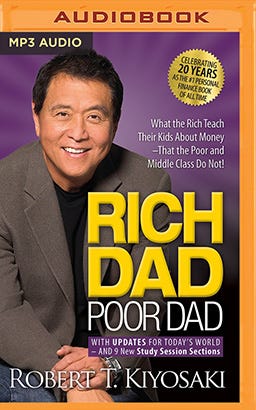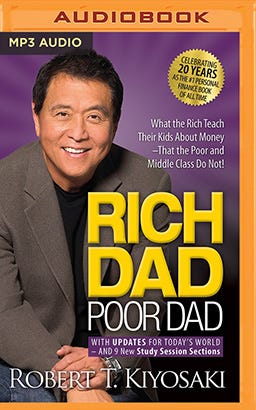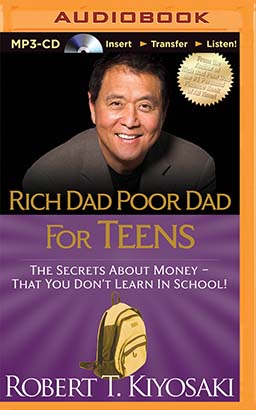“Rich Dad Poor Dad,” authored by Robert T. Kiyosaki,
is a personal finance classic that challenges conventional beliefs about money and offers invaluable insights on how to attain financial independence. In this 1000-word review, we will delve into the core principles and teachings presented in the book, emphasizing its impact on financial mindset, wealth-building strategies, and the importance of financial education.
The book centers around Kiyosaki’s childhood, where he had two father figures with vastly different approaches to money – his biological father (Poor Dad) and the father of his best friend (Rich Dad). These two contrasting perspectives became the foundation for Kiyosaki’s financial philosophy and are woven throughout the narrative.
One of the central themes of “Rich Dad Poor Dad” is the importance of financial education. Kiyosaki criticizes the traditional education system for failing to teach vital financial principles, leaving many individuals ill-prepared to manage money effectively. He argues that gaining financial literacy is crucial for achieving financial success and advises readers to seek out opportunities to expand their knowledge in this area.

The book introduces the concept of assets and liabilities as critical components of financial health. Kiyosaki defines assets as things that put money in your pocket, while liabilities are things that take money out. He encourages readers to focus on acquiring income-generating assets rather than accumulating liabilities, such as consumer goods or a large mortgage.
One of the most impactful ideas in “Rich Dad Poor Dad” is the importance of shifting from an employee mindset to that of a business owner or investor. Kiyosaki emphasizes the significance of financial independence and passive income streams to break free from the cycle of working for money and instead having money work for you. This paradigm shift can be transformative for those seeking greater financial freedom.
Kiyosaki also highlights the power of entrepreneurship as a means to wealth creation. He believes that starting and owning a business can provide greater control over one’s financial destiny and open up opportunities for exponential growth. The book advocates taking calculated risks and embracing failure as a stepping stone to success.
Moreover, the book cautions against excessive reliance on job security and highlights the risks associated with traditional employment. Kiyosaki challenges readers to question the prevailing belief that job stability equates to financial security, making a compelling case for diversifying income sources.
“Rich Dad Poor Dad” also delves into the significance of mindset and emotional intelligence in managing finances. Kiyosaki underscores the importance of overcoming fear and the need to be aware of one’s emotions when making financial decisions. He believes that mastering emotions and controlling impulses are crucial for building long-term wealth.
While “Rich Dad Poor Dad” offers unique insights and a fresh perspective on financial matters, some critics argue that Kiyosaki’s advice can be overly simplistic and impractical in certain scenarios. For example, starting a business and investing in real estate might not be feasible or suitable for everyone, depending on individual circumstances and resources.
Additionally, some financial experts question the lack of specific actionable steps or detailed investment advice in the book. While Kiyosaki encourages readers to think differently about money, some may seek more concrete guidance on how to implement his teachings in their own lives.
It is essential to acknowledge that “Rich Dad Poor Dad” has faced controversy and criticism for the validity of the “Rich Dad” character’s existence and the accuracy of certain events portrayed in the book. Some have questioned whether the book is entirely autobiographical or if it includes fictional elements. Despite these concerns, the book’s core messages and financial principles remain relevant and influential.
In conclusion, “Rich Dad Poor Dad” is a groundbreaking book that challenges conventional financial wisdom and promotes a mindset shift towards financial independence and wealth creation. Robert T. Kiyosaki’s emphasis on financial education, entrepreneurship, and the pursuit of income-generating assets resonates with millions of readers worldwide. While some critics may find the advice overly simplistic and lacking in actionable steps, the book’s value lies in its ability to inspire readers to reconsider their beliefs about money and seek financial freedom through alternative paths. Whether you are a financial novice or an experienced investor, “Rich Dad Poor Dad” is a must-read for those seeking to take control of their financial destiny and build lasting wealth

Rich Dad Poor Dad ( Original & Complete) Hindi’s BOOK
व्यक्तिगत वित्त-प्रबंधन #1 पुस्तक!• यह मिथक तोड़ती है कि अमीर बनने के लिए ज़्यादा कमाना ज़रूरी है – ख़ासकर ऐसी दुनिया में जहाँ तकनीक, रोबोट और एक वैश्विक अर्थव्यवस्था से नियम बदल रहे हैं• यह सिखाती है कि क्यों भविष्य के लिहाज़ से भारी-भरकम वेतन पाने के बजाय संपत्ति हासिल करना और बनाना ज़रूरी हो सकता है – और वे कौन-से टैक्स के लाभ हैं जो निवेशक तथा बिज़नेस मालिक प्राप्त करते हैं•



